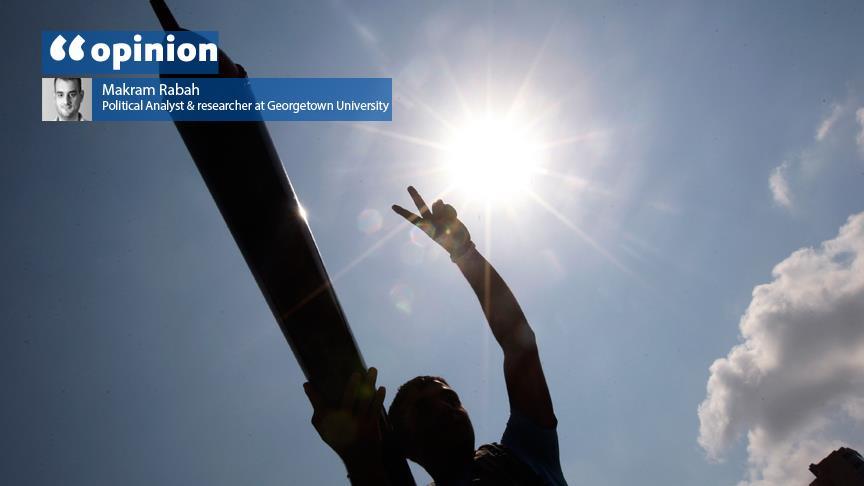The Lebanese civil war and the road not taken
Simply condemning the war – and those who fought in it – is not enough to create a viable new Lebanese political movement

Beyrut
By Makram Rabah
BEIRUT
In mid-April of every year, the Lebanese people recall their devastating 15-year-long civil war (which began on April 13, 1975) with mixed feelings and calls for unity and solidarity.
Events organized to mark the anniversary by various civil society groups range from celebrity lineups that cut across sectarian lines -- which blame the war on corrupt sectarian leaders -- to op-eds and newspaper feature stories like the one you are reading.
Now, social media outlets are allowing a new generation to make their views known on the occasion of the war anniversary -- even though many of them were born after the conflict ended in 1990.
While many of these comments and posts condemn war and violence, the crux of their arguments nevertheless tends to adopt the same logic used by the warring factions throughout the conflict.
Forty-one years have elapsed since the start of the war. Much of what Lebanese youth know about the conflict comes from the stories they hear from their elders or through online media -- and much of it is the creation of the warring parties themselves, or a rehashed version intended to serve contemporary aims.
Some of these youths see war-era footage and songs from the time as a reminder of a former glory that they yearn to relive or which provides them with purpose in life.
This purpose can be of a personal nature, such as mere self-promotion or a lust for power (of the kind only an AK-47 can provide), or it can serve a larger, existential purpose related to the defense or reform of their own view of Lebanon.
Even those youths or factions who see themselves outside Lebanon’s usual sectarian, tribal dichotomy can fall prey to the vicious circle of rhetoric, which ranges from total rejection of the current political establishment to an utterly nihilist approach.
While these individuals and groups are allowed to strive to meet their own goals in any way they deem fit, their detachment from the country’s current realities ultimately helps empower the sectarian system that they themselves say they want to destroy.
As it stands, the Lebanese parliament has failed to elect a president of the republic since May 2014. Ever since, the government of Prime Minister Tammam Salam has attempted to maintain respect for an almost imploding Lebanese state, but has failed miserably.
One of the government’s most spectacular failures was its inability to manage the simple task of waste management, leaving the entire country swimming in garbage.
Consequently, a grassroots movement that sought to resolve the abysmal sanitation situation took to the streets, initially demanding a solution to the crisis in a modern and transparent manner.
However, a lack of clear planning and infighting -- coupled with the craftiness of the ruling junta -- ultimately turned this movement into a semi-anarchist phenomenon that only empowered the ruling elite.
Perhaps the cardinal sin(s) that these factions committed was to believe that the Lebanese masses would abandon their traditional leaders and follow a young faction that aimed to destroy a primordial system, which -- despite its many shortcomings -- caters to their petty clientelistic demands.
In this respect, it is interesting to observe that the same failed methods employed by these independent activists to protest the garbage crisis were also employed for the past 26 years -- since the war officially ended -- in an effort to nurture a new liberal, secular political movement.
This movement, righteous as it seems, was not able to muster enough support because it refused to recognize sectarian tribal realities and thus failed to address them properly.
Simply condemning the war -- and the people who fought in it -- is insufficient on its own to create a new movement.
Looking at Lebanon’s current predicament -- a failed state, a highly polarized sectarian standoff and a raging civil war across the border in Syria -- one ought to take the aforementioned experiences into consideration to avoid a further descent into chaos.
Lebanese youth, like their predecessors in the 1970s, are now growing up in a world in which a sense of anarchy and absurdity prevail.
This, in addition to other factors, could -- in one way or another -- help start the kind of cycle of violence that destroyed Lebanon as a poster-child for coexistence.
It would be mutually beneficial for all Lebanese -- including those who claim to be from outside the sectarian system -- to learn from previous experience and abandon their dreams of a radical revolution and instead employ a sober, gradualist approach to Lebanon’s political challenges.
Perhaps then, the Lebanese will have learned from their civil war.
The views expressed in this article belong to the author and do not necessarily reflect the editorial policy of Anadolu Agency.
Anadolu Agency website contains only a portion of the news stories offered to subscribers in the AA News Broadcasting System (HAS), and in summarized form. Please contact us for subscription options.

